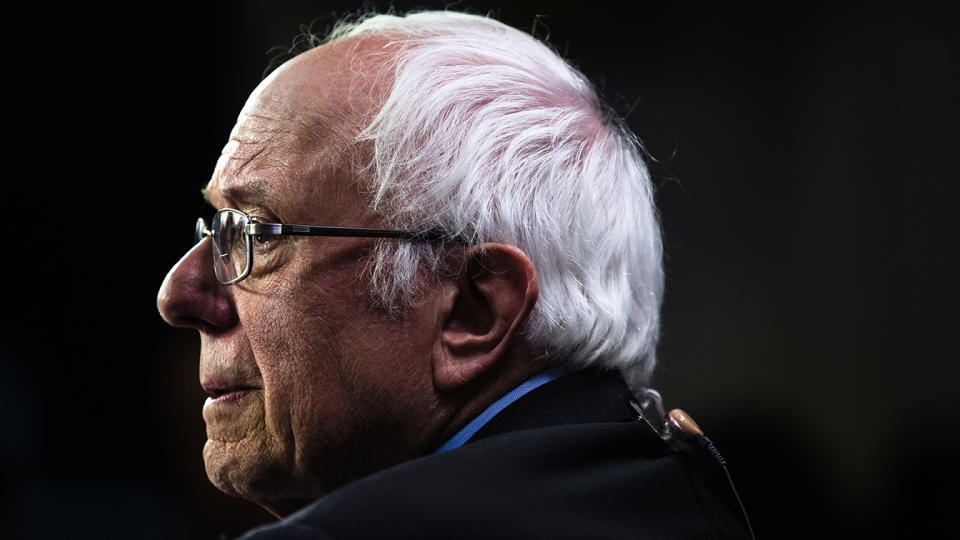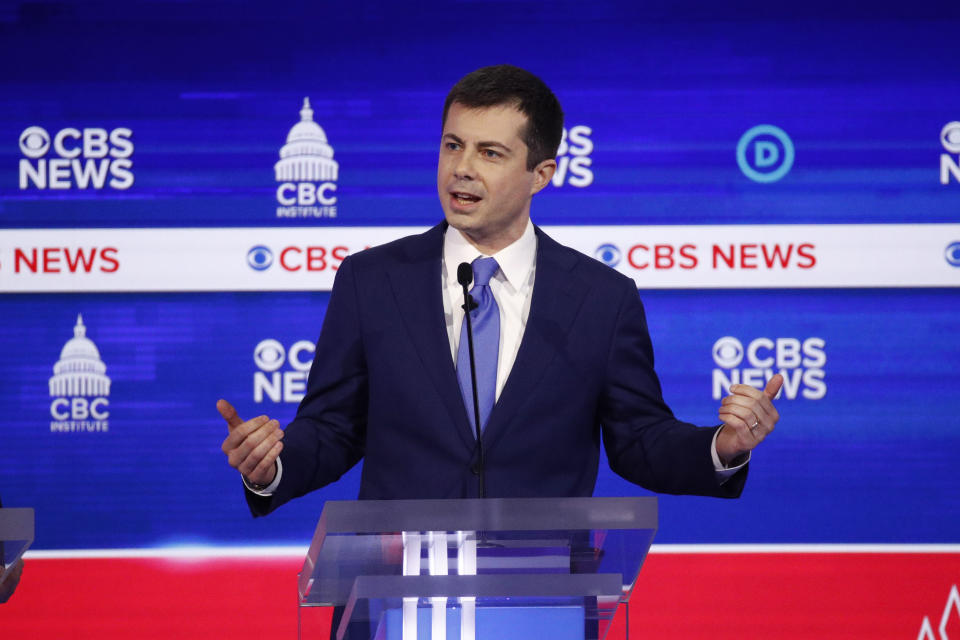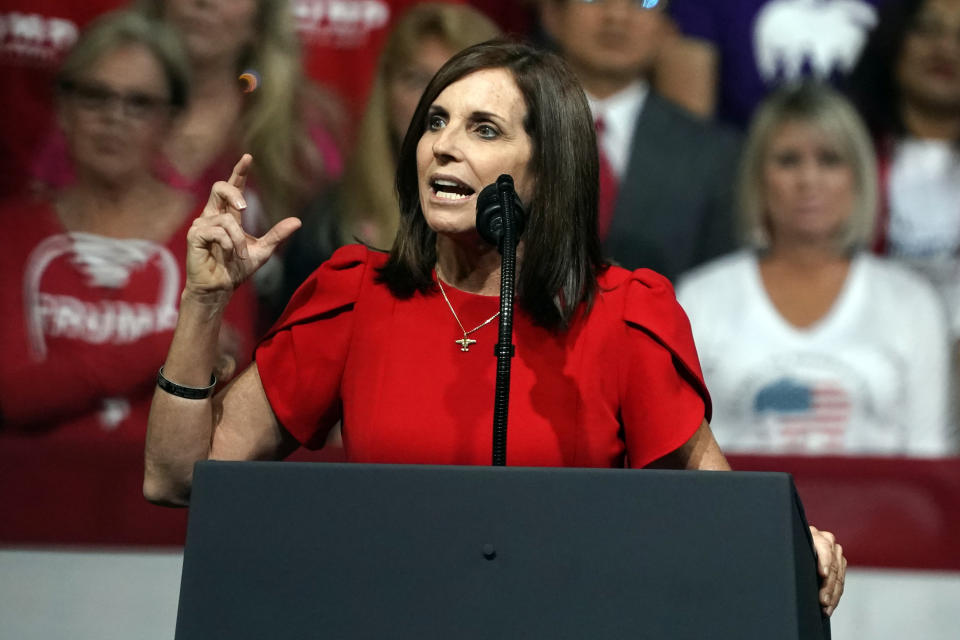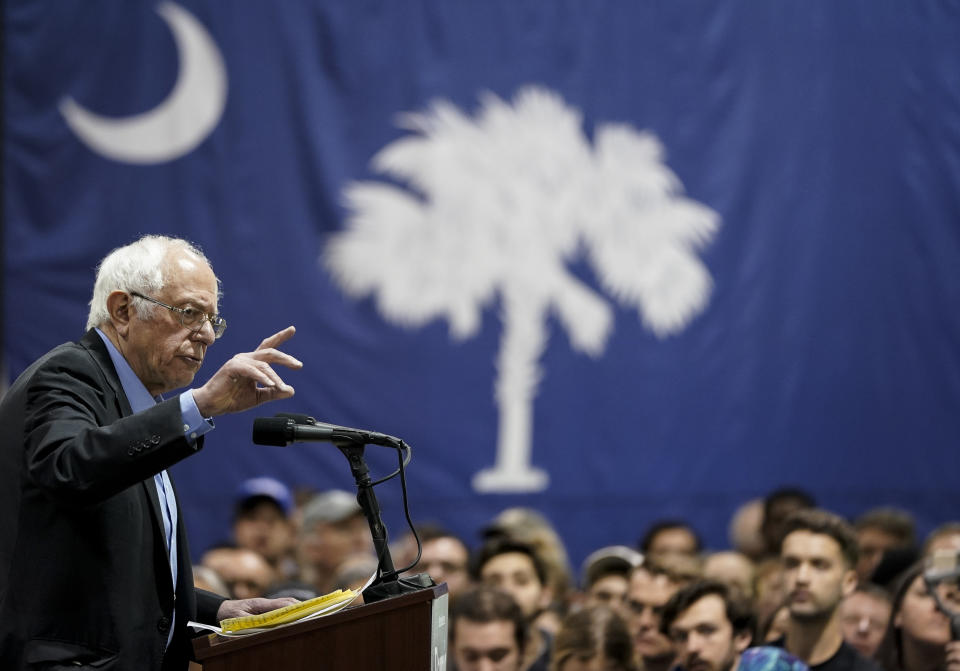Sanders surge spreads fear among House and Senate Democrats
By now most political observers are probably familiar with the so-called electability argument against Democratic frontrunner Bernie Sanders: He’s a self-described democratic socialist who will lose swing voters to President Trump. They’ve probably heard Sanders’s rebuttal as well: that he’ll make up for it with “the highest voter turnout in history,” particularly among young voters, new voters and voters of color.
But during last night’s Democratic debate in Charleston, S.C., several of Sanders’s rivals tried to blunt his momentum ahead of Saturday’s Palmetto State primary by claiming, for the first time in a national setting, that the problem isn’t just that the Vermont senator is unelectable himself.
It’s that nominating him would make dozens of down-ballot Democratic House, Senate and state legislature candidates more vulnerable, too.

“I’ll tell you exactly what [Sanders’s agenda] adds up to,” said Pete Buttigieg. “It adds up to four more years of Donald Trump, [House GOP Minority Leader] Kevin McCarthy as speaker of the House and the inability to get the Senate into Democratic hands. The time has come for us to stop acting like the presidency is the only office that matters. Not only is this a way to get Donald Trump reelected — we got a House to worry about. We got a Senate to worry about. And this is really important.”
A few minutes later, Michael Bloomberg piled on. “If [this] keep[s] on going, we will [nominate] Bernie,” Bloomberg said. “Bernie will lose to Donald Trump. And Donald Trump and the House and the Senate and some of the state houses will all go red.”

The logic here is elementary. Sanders is very, very liberal. Places with competitive House and Senate races are, almost by definition, not. Ergo, putting Sanders at the top of the ticket would make it harder for those candidates to win; harder for Democrats to keep the House and flip the Senate; and harder, ultimately, for Sanders to pass anything if he becomes president — and easier for Trump to enact his second-term agenda if Sanders loses.
The question is whether there’s any evidence to back up this prediction.
The answer, it turns out, is yes: in the results of the 2018 midterms. Two years ago, as New York magazine columnist Jonathan Chait has pointed out, “the Democratic Party was the subject of bitter and widespread criticism from its left wing.” Chait continues:
“The party’s strategy was to flip the House by recruiting moderate candidates who would avoid controversial left-wing positions and instead focus attention on Trump’s agenda, especially his effort to eliminate Obamacare. The left predicted the strategy would fail — only an inspiring progressive agenda could mobilize enough voters to win back the House.”
So who was right? The establishment, by a mile. On Election Day 2018, Democrats picked up 41 House seats, their biggest victory since Watergate. Thirty-one of those districts were districts Trump won in 2016, and pretty much every candidate who flipped a seat from red to blue — in working-class Obama-to-Trump counties from Michigan to Iowa to Maine; in upscale Romney-Clinton suburbs from California to Texas to New Jersey — fit the low-risk moderate mold. Progressives, meanwhile, managed to nominate several candidates in red districts — Kara Eastman in Nebraska, Richard Ojeda in West Virginia — but all of them lost. “Our Revolution went 0–22, Justice Democrats went 0–16 and Brand New Congress went 0–6,” Chait notes, citing the win-loss records of several pro-Sanders organizations. “The failed technocratic 26-year-old bourgeois shills who were doing it wrong somehow accounted for 100 percent of the party’s House gains.” If candidates in Sanders’s mold couldn’t win swing districts in 2018, why would nominating Sanders himself help Democrats win those same districts in 2020?
The candidates themselves seem to agree with this analysis. Of the 46 Democratic representatives who hold districts classified by Sabato’s Crystal Ball as at least marginally competitive, not one has endorsed Sanders. Some have gone further and actively distanced themselves from their party’s potential nominee. Anthony Brindisi of upstate New York said he would not support Sanders; Joe Cunningham agreed, insisting that “South Carolinians don’t want socialism.” Sanders’s (admittedly qualified) praise for Fidel Castro in an interview on “60 Minutes” terrified two freshman House members from South Florida, Donna Shalala and Debbie Mucarsel-Powell, whose districts include many staunchly anti-communist refugees from Cuba. In the House, eight of the frontline Democrats, including Haley Stevens of Michigan, Max Rose of New York and Lucy McBath of Georgia, have endorsed Bloomberg. Others, including several military veterans — Conor Lamb and Chrissy Houlahan of Pennsylvania and Elaine Luria of Virginia — are coalescing around Joe Biden.
Meanwhile, the leading Democratic candidates for the four most vulnerable Republican Senate seats — in Arizona, North Carolina, Maine and Colorado — have all come out against Medicare for All, Sanders’s signature health care plan.
Yet after Arizona Democrat Mark Kelly, the former astronaut, tepidly said he would “support who the nominee is of the Democratic Party” in response to a question about Sanders, incumbent Republican Sen. Martha McSally launched a 30-second ad titled “Bernie Bros,” tying Kelly to Sanders’s agenda and declaring that “Kelly and Sanders” are “too liberal for Arizona.”

Consider that a preview of things to come. “I can tell you that there are a lot of down-ballot jitters based on my conversations with my former colleagues,” former Rep. Steve Israel of New York, a longtime confidant of House Speaker Nancy Pelosi who led congressional election efforts from 2011 to 2015, told the Washington Post. “Donald Trump is going to offer the American people this choice: Do you want to continue building the economy or do you want to lurch toward socialism? And that is a real powerful argument in the Democratic districts that Trump won in 2016.”
It’s a point Buttigieg made during Tuesday’s debate in Charleston: Because politicians are experts in self-preservation, and because they tend to understand the politics of their states and districts better than anyone else, it’s worth considering how they think Sanders would affect them when trying to gauge his likely impact on the rest of the Democratic Party in November.
“If you want to keep the House in Democratic hands, you might want to check with the people who actually turned the House blue,” Buttigieg said onstage. “Forty Democrats who are not running on your platform. They are running away from your platform as fast as they possibly can. I want to send those Democrats back to the United States House. Let's listen to them when they say that they don't want to be out there defending Sen. Sanders.”
It’s possible, of course, that Buttigieg & Co. are getting this wrong. Asked Wednesday about Sanders, Pelosi said that “whoever our nominee is, we will enthusiastically embrace and we will win the White House, the Senate and the House.” Sanders, naturally, agrees; earlier this month he dismissed the doubts among down-ballot Dems, telling reporters that to win, “we’re going to have to get young people a lot more involved in the political process” and “expand minority voting.”
“I think we have a campaign to do that,” he added.
In an interview Tuesday with the Washington Post, Sanders’s pollster Ben Tulchin expanded on this idea, claiming that because the “suburban voters” who fueled Democrats in 2018 “hate Trump,” they’ll “vote for the Democrat” no matter who it is.
“Bernie can add to that coalition,” Tulchin continued, claiming that his boss has “a unique appeal with working-class voters” and “can be more effective” in Michigan, Wisconsin and Pennsylvania as a result. “He does well in rural and white working-class districts where Democrats have struggled. Bernie brings something different to the mix that can actually put more districts in play. There’s an upside to him that’s getting discounted right now.”

In addition, voters can differentiate between the party’s presidential nominee and its state or local candidates — especially when those state and local candidates have tons of cash at their disposal to advertise those differences.
“Democrats enjoy an enormous financial advantage right now in most of these Senate and House races ... to make the case that they’re different from Bernie Sanders and that they’re pragmatists and that they won’t veer the country off a democratic socialist cliff,” expert House analyst Dave Wasserman of the Cook Political Report recently told NPR. “And so it’s going to be difficult for Republicans to simply paint those Democratic freshmen or candidates like Mark Kelly in with Bernie Sanders with a broad brush.”
And while ticket splitting is rarer in this polarized era than it used to be, it “can and still does occur,” as political analyst Kyle Kondik recently explained. One time it does tend to occur, according to the research, is when voters “split their tickets against the party they believe will win the White House as a way to put a check on the likely winner.” Since two-thirds of Americans assume Trump will win reelection, this effect could help House Democrats do better than expected in 2020 — even if Bernie is on the ballot.
So who knows how the math will work out. But the bottom line remains the same: Sanders represents a unique risk for down-ballot Democrats. Last week, a Washington Post-ABC News Poll found that of all the leading presidential candidates, Sanders performs the poorest against Trump among college-educated white women, the group most responsible for the party’s 2018 House majority. This week, a new study by political scientists at Yale and the University of California, Berkeley, showed that nominating Sanders would drive many Americans who would otherwise vote for a moderate Democrat to vote for Trump — losses that Sanders could only offset by inspiring an unprecedented 11-percentage-point turnout boost among young left-leaning voters, who haven’t showed up at anything approaching that level so far this year.
In the end, Mitch McConnell probably got it right Tuesday when a reporter asked if he believed that Sanders would help the GOP maintain its Senate majority.
“I’m reminded of when the Democrats back in 1980 were all pulling for Ronald Reagan to be the nominee because they thought he’d be the easiest to beat,” the Senate majority leader said. “I think Republicans speculating about which Democratic candidate for president would be the easiest to beat may be a bit foolish. I think it’s going to be a contested general election with a lot of energy on both sides.”
Read more from Yahoo News:



